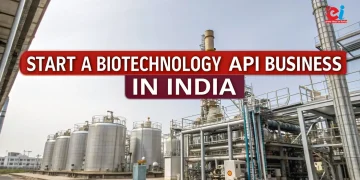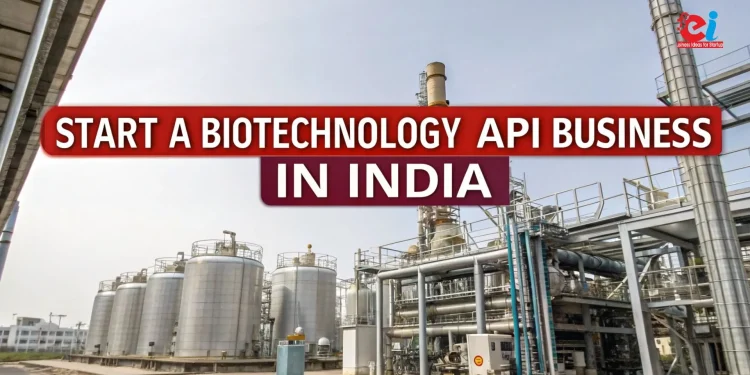India’s healthcare and biotechnology Api sectors have undergone tremendous change in the post-pandemic period. While the world was focused on vaccine manufacturing, Diagnostics and Biotech APIs (Active Pharmaceutical Ingredients), APIs are silently emerging as another long-term growth driver. These molecular constituents lie at the interface of contemporary diagnostics, therapeutics, and next-gen medical technologies.
About India’s biotech API sector as highlighted on the June 3rd, 2025 issue of Chemical Weekly, India’s biotech API sector is…
According to other studies, this is an ideal time for entrepreneurs and MSMEs to tap into innovation-led, high-growth industries that have both domestic need and export potential.
What Are Biotech APIs?
Biotech APIs are active ingredients used in therapeutic drugs, diagnostics, and biosensors derived from biological sources such as:
- Recombinant DNA technology
- Fermentation of Cell Culture
- Expression of Proteins and Enzymes
- Nucleic Acid Synthesis such as mRNA and DNA probes
- Monoclonal Antibodies and Peptide-based APIs
Biotech APIs play a significant role in the production of diagnostic tools, including PCR reagents, ELISA kits, CRISPR components, immunoassays, and biosensors.
Why This Sector Is a Growth Engine
- Diagnostics Market In India: Projected to reach 20 billion by 2030.
- Demand for Biotech API: Fueled by the growth of biosimilars, advanced diagnostics, and personalized medicine.
Imagine the world as a single entity: there is a Global Trend revolving around advanced treatments like biologics, targeted therapies and point-of-care diagnostics, which are provided at the exact facility where a patient is diagnosed.
While India is actively working domestically to manage its economy during the Import Substitution phase, specifically with reagents and diagnostic tools, it’s a bit concerning that more than 70% of biotech imports come from outside the country.
And finally, Atmanirbhar Bharat – a government propelled initiative intended to make India self-sufficient in terms of life science infrastructure – represents Strategic Focus.
Related: India’s Biotechnology Sector
Key Biotechnology API Segments for Entrepreneurs
1. PCR Reagents and Enzymes
Includes:
Taq polymerase, reverse transcriptase, and DNA ligases
Market Drivers: RT-PCR testing for infectious diseases and genetic diagnostics
Startup Model: Contract manufacturing or OEM supply for brands selling diagnostic kits.
Innovation: Development of high-fidelity enzymes that are stable at room temperature.
2. ELISA and Rapid Test Reagents
Key Products: HRP conjugated antibodies, protein antigens, buffers.
Demand Sectors: Veterinary diagnostics, human disease detection, food safety testing.
MSME Opportunity: Serve regional diagnostic kit players and export to Africa and South Asia.
3. Peptides and Recombinant Proteins
Applications: Cancer detection kits, hormone assays, immunotherapy diagnostics.
Technical Needs: Solid-phase synthesis or microbial fermentation expression based on biology.
Export Scope: Companies in Europe and the US who manufacture biosimilars and want cheaper suppliers.
4. Nucleic Acid Probes and Primers
Products: Synthetic DNA or RNA oligonucleotides, CRISPR guide RNAs.
Customers: Genetic testing laboratories, forensic science units, biotech research start ups.
Automation Model: Oligo synthesizers for MSME setups at medium scale.
5. Lateral Flow Assay Components
Includes: Colloidal gold nanoparticles, nitrocellulose membranes, capture reagents.
Use Cases: Pregnancy kits, COVID-19 antigen kits, and veterinary screening tools.
Business Potential: Local manufacturing could cut 60–80% of imports.
6. Monoclonal Antibodies For Diagnostics
Use: Immunoassays, biomarker detection, and in-vitro diagnostics (IVDs).
Scope: Culturing cell lines, hybridomas, or constructing recombinant antibodies
Market Driver: Growth of private diagnostic chains and hyper-personalized medicine.
Manufacturing Requirements
- Cleanroom Infrastructure: For bioreagents, ISO Class 7 or higher is required.
- Equipment: Bioreactors, fermenters, chromatography systems, lyophilizers.
- QC Instruments: HPLC, gel electrophoresis, spectrophotometry, and qPCR (quantitative polymerase chain reaction) platforms.
- Compliance: GMP (Good Manufacturing Practices) for biopharma, ISO 13485 for diagnostic components.
Startup Models to Explore
- OEM (Original Equipment Manufacturer) Supplier for Diagnostic Kit Makers
Manufacture base reagents (buffers, enzymes, and antibodies) for third-party brand labeling. - Integrated Diagnostic API (Active pharmaceutical ingredients) producer
Combine upstream (recombinant production) with downstream (kit assembly). - R&D Services and Contract Manufacturing
Provide diagnostics innovators with fermentation and protein expression services. - CRISPR Component Developer
Guide RNA, Cas protein, and CRISPR tool for modern diagnostics. - Peptide synthesis for exports
Supply research and diagnostics firms worldwide with Indian-made peptides.
Government Support & Incentive Schemes
- Parks and Clusters Biotech: Located In Bengaluru, Hyderabad, Pune, And Baddi
- Funding For Fermentation Technology, Biosimilars And Vaccines under National Biopharma Mission (DBT)
- Monetary Support for value-added biomanufacturing under PLI Scheme Biopharma
- Grants for Startups under Indian Start-Up Policy and BIRACs of young companies for R&D, pilot scale work
Challenges & With Solution Strategies
- Cold Chain Logistics: Create lyophilized reagents that are stable at room temperature or are lyophilized
- Shortage Of Skilled Work Force: Work with biotech colleges and CSIR laboratories
- Tech Limitations: Restricting access to expression systems or recombinant strains based on academia
- Insufficiently Defined Legal Boundaries: Move towards adopting ISO and WHO-PQ regulations earlier in a product’s lifecycle
Shifting Trends And Future Directions
- Home Diagnostic Tests: Created demand for simple to use, sturdy, inexpensive kits
- AI Powered Diagnostics: Need custom application programming interfaces, biosensors and AI driven systems
- Molecular Testing At The Point Of Care: ‘Lab On A Chip’ technology, reagents based on nanotechnology
- Multiplexing: Application Programming Interfaces to detect three to five diseases in a single test
- Companion Diagnostics: APIs that function together with biosimilar or biologic therapies
Examples Of Cases
- Scaling Up Global Procurement of PCR Kits and Enzymes – Molbio Diagnostics from Goa
- Stepping Into the Realm of Biotech API – Immuneel and Bugworks sharing their collaborative diagnostics R&D
- Offering CRDMO Services to the players of diagnostics – Aragen Life Sciences
Conclusion
Looking ahead, advanced technologies and social relevance to create competitive businesses, entrepreneurs, and MSMEs in India target diagnostics and biotech APIs.
The need for local biotech manufacturing is critical due to increasing expenditures on healthcare, the global shift away from China, and the digitization of medicine. For anyone who has the courage to take on the challenges associated with the molecular level of diagnostic imaging, the opportunities are not only numerous— they are breathtaking.
About NPCS
NPCS’s niche lies in providing Detailed Project Reports (DPRs) along with Techno-Economic Feasibility Studies (TEF), and Custom Market Research tailored for startups in biotechnology, diagnostics, and healthcare manufacturing sectors.
NPCS also helps in project planning and implementation, plant establishing, funding, policy alignment, and other areas to ensure smooth entrepreneurial journey from idea to market.


















